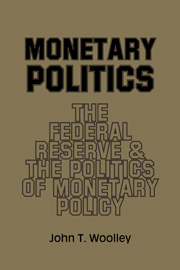Book contents
- Frontmatter
- Contents
- Preface
- 1 The Federal Reserve and the Politics of Monetary Policy: Introduction and Overview
- 2 A Capsule History of the Federal Reserve System
- 3 Recruitment and Selection of Federal Reserve Personnel
- 4 Bankers and the Federal Reserve
- 5 Economists and the Federal Reserve
- 6 The President and the Federal Reserve
- 7 Congress and the Federal Reserve
- 8 Making Monetary Policy in a Political Environment: The Election of 1972
- 9 Monetary Politics: A Summary
- Appendix A A Note on Data Sources
- Appendix B Legislation Included in Table 7.1
- Appendix C Academic Backgrounds and Career Experiences of Notable Monetarists
- Notes
- Bibliographic Note
- Index
9 - Monetary Politics: A Summary
Published online by Cambridge University Press: 01 June 2011
- Frontmatter
- Contents
- Preface
- 1 The Federal Reserve and the Politics of Monetary Policy: Introduction and Overview
- 2 A Capsule History of the Federal Reserve System
- 3 Recruitment and Selection of Federal Reserve Personnel
- 4 Bankers and the Federal Reserve
- 5 Economists and the Federal Reserve
- 6 The President and the Federal Reserve
- 7 Congress and the Federal Reserve
- 8 Making Monetary Policy in a Political Environment: The Election of 1972
- 9 Monetary Politics: A Summary
- Appendix A A Note on Data Sources
- Appendix B Legislation Included in Table 7.1
- Appendix C Academic Backgrounds and Career Experiences of Notable Monetarists
- Notes
- Bibliographic Note
- Index
Summary
One of the greatest difficulties a political scientist faces in trying to study monetary politics is finding a productive way to analyze the issues that dominate public discussion and debate. For many political scientists, the basic questions motivating their inquiry have to do with the way the clash of interests in political arenas produces allocative consequences. The traditional emphasis on such questions, even in behavioral political science, has been substantial.
In trying to comprehend monetary policy, then, many political scientists would naturally inquire about distributive issues and would examine the process of policy making for signs of conflict related to these issues. The search would be a frustrating one. A great deal of the most visible debate about monetary policy is not explicitly about distributive issues. It is a battle of technicians, and the stakes are not at all obvious to those not among the congnoscenti. As we have seen, there are important distributive consequences associated with different positions in the technical debate. For example, the monetarists argue that distributive considerations must be subordinated to the fight against inflation.
It is true that the distributive implications of different kinds of monetary policy actions are difficult to sort out in this area. It is frequently not clear who benefits or loses – which sectors of business and finance, which income classes, which parts of income classes.
- Type
- Chapter
- Information
- Monetary PoliticsThe Federal Reserve and the Politics of Monetary Policy, pp. 181 - 194Publisher: Cambridge University PressPrint publication year: 1984
- 1
- Cited by



